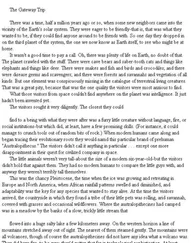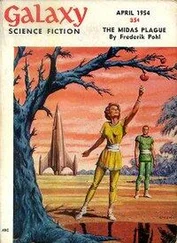Pohl, Frederik - Beyond the Blue Event Horizon
Здесь есть возможность читать онлайн «Pohl, Frederik - Beyond the Blue Event Horizon» весь текст электронной книги совершенно бесплатно (целиком полную версию без сокращений). В некоторых случаях можно слушать аудио, скачать через торрент в формате fb2 и присутствует краткое содержание. Жанр: Старинная литература, на английском языке. Описание произведения, (предисловие) а так же отзывы посетителей доступны на портале библиотеки ЛибКат.
- Название:Beyond the Blue Event Horizon
- Автор:
- Жанр:
- Год:неизвестен
- ISBN:нет данных
- Рейтинг книги:4 / 5. Голосов: 1
-
Избранное:Добавить в избранное
- Отзывы:
-
Ваша оценка:
- 80
- 1
- 2
- 3
- 4
- 5
Beyond the Blue Event Horizon: краткое содержание, описание и аннотация
Предлагаем к чтению аннотацию, описание, краткое содержание или предисловие (зависит от того, что написал сам автор книги «Beyond the Blue Event Horizon»). Если вы не нашли необходимую информацию о книге — напишите в комментариях, мы постараемся отыскать её.
Beyond the Blue Event Horizon — читать онлайн бесплатно полную книгу (весь текст) целиком
Ниже представлен текст книги, разбитый по страницам. Система сохранения места последней прочитанной страницы, позволяет с удобством читать онлайн бесплатно книгу «Beyond the Blue Event Horizon», без необходимости каждый раз заново искать на чём Вы остановились. Поставьте закладку, и сможете в любой момент перейти на страницу, на которой закончили чтение.
Интервал:
Закладка:
Beyond the Blue Event Horizon A Del Rey Book
Published by Ballantine Books
Copyright c 1980 by Frederik Pohl All rights reserved under International and Pan-American Copyright Conventions. Published in the United States by Ballantine Books, a division of Random House, Inc., New York, and simultaneously in Canada by Random House of Canada, Limited, Toronto, Canada.
Manufactured in the United States of America
CONTENTS
1 Wan
2 On the Way to the Oort Cloud
3 Wan in Love
4 Robin Broadhead, Inc
5 Janine
6 After the Fever
7 Heechee Heaven
8 Schwarze Peter
9 Brasilia
10 The Oldest One
11 S. Ya. Lavorovna
12 Sixty Billion Gigabits
13 At the Halfway Point
14 The Long Night of the Dreams
15 Older Than the Oldest One
16 The Richest Person There Is
17 The Place Where the Heechee Went
ABOUT THE AUTHOR
1 Wan
It was not easy to live, being young, being so completely alone. “Go to the gold, Wan, steal what you want, learn. Don’t be afraid,” the Dead Men told him. But how could he not be afraid? The silly but worrisome Old Ones used the gold passages. They might be found anywhere in them, most likely at the ends of them, where the gold skeins of symbols ran endlessly into the center of things. That is, exactly where the Dead Men kept coaxing him to go. Perhaps he had to go there, but he could not help being afraid.
Wan did not know what would happen if the Old Ones ever caught him. The Dead Men probably knew, but he could not make any sense out of their ramblings on the subject. Once long ago, when Wan was tiny-when his parents were still alive, it was that long ago-his father had been caught. He had been gone for a long time and then had come back to their green-lit home. He was shaking, and two-year-old Wan had seen that his father was afraid and had screamed and roared because that was so frightening to him.
Nevertheless he had to go to the gold, whether the grave old frog-jawed ones were there or not, because that was where the books were. The Dead Men were well enough. But they were tedious, and touchy, and often obsessed. The best sources of knowledge were books, and to get them Wan had to go where they were.
The books were in the passages that gleamed gold. There were other passages, green and red and blue, but there were no books there. Wan disliked the blue corridors, because they were cold and dead, but that was where the Dead Men were. The green was used up. He spent most of his time where the winking red cobwebs of light were spread against the walls and the hoppers still held food; he was sure to be untroubled there, but he was also alone. The gold was still in use, and therefore rewarding, and therefore also perilous. And now he was there, cursing fretfully to himself-but under his breath-because he was stuck. Bloody damn Dead Men! Why did he listen to their blathering?
He huddled, trembling, in the insufficient shelter of a berry bush, while two of the foolish Old Ones stood thoughtfully plucking berries from its opposite side and placing them precisely into their froggy mouths. It was unusual, really, that they should be so idle. Among the reasons Wan despised the Old Ones was that they were always busy, always fixing and carrying and chattering, as though driven. Yet here these two were, idle as Wan himself.
Both of them had scraggly beards, but one also had breasts. Wan recognized her as a female he had seen a dozen times before; she was the one who was most diligent in pasting colored bits of something-paper? plastic?-onto her sari, or sometimes onto her sallow, mottled skin. He did not think they would see him, but he was greatly relieved when, after a time, they turned together and moved away. They did not speak. Wan had almost never heard any of the grave old frog-jaws speak. He did not understand them when they did. Wan spoke six languages well-his father’s Spanish, mother’s English, the German, the Russian, the Cantonese and the Finnish of one or another of the Dead Men. But what the frog-jaws spoke he did not comprehend at all.
As soon as they had retreated down the golden corridor-quick, run, grab! Wan had three books and was gone, safely back in a red corridor. It might be that the Old Ones had seen him, or perhaps not. They did not react quickly. That was why he had been able to avoid them so long. A few days in the passages, and then he was gone. By the time they had become aware he was around, he wasn’t; he was back in the ship, away.
He carried the books back to the ship on top of a pannier of food packets. The drive accumulators were nearly recharged. He could leave whenever he liked, but it was better to charge them all the way and he did not think there was any need to hurry. He spent most of an hour filling plastic bags with water for the tedious journey. What a pity there were no readers in the ship to make it less tedious! And then, wearying of the labor, he decided to say good-bye to the Dead Men. They might, or might not, respond, or even care. But he had no one else to talk to.
Wan was fifteen years old, tall, stringy, very dark by nature and darker still from the lights in the ship, where he spent so much of his time. He was strong and self-reliant. He had to be. There was always food in the hoppers, and other goods for the taking, when he dared. Once or twice a year, when they remembered, the Dead Men would catch him with their little mobile machine and take him to a cubicle in the blue passages for a boring day during which he was given a rather complete physical examination. Sometimes he had a tooth filled, usually he received some long-acting vitamin and mineral shots, and once they had fitted him with glasses. But he refused to wear them. They also reminded him, when he neglected it too long, to study and learn, both from them and from the storehouses of books. He did not need much reminding. He enjoyed learning. Apart from that, he was wholly on his own. If he wanted clothes, he went into the gold and stole them from the Old Ones. If he was bored, he invented something to do. A few days in the passages, a few weeks on the ship, a few more days in the other place, then back to repeat the process. Time passed. He had no one for company, had not had since he was four and his parents disappeared, and had almost forgotten what it was like to have a friend. He did not mind. His life seemed complete enough to him, since he had no other life to compare it with.
Sometimes he thought it would be nice to settle in one place or another, but this was only dreaming. It never reached the stage of intention. For more than eleven years he had been shuttling back and forth like this. The other place had things that civilization did not. It had the dreaming room, where he could lie fiat and close his eyes and seem not to feel alone. But he could not live there, in spite of plenty of food and no dangers, because the single water accumulator produced only a trickle. Civilization had much that the outpost did not have: the Dead Men and the books, scary exploring and daring raids for clothes or trinkets, something happening. But he could not live there either, because the frog-jaws would surely catch him sooner or later. So he commuted.
The main lobby door to the place of the Dead Men did not open when Wan stepped on the treadle. He almost bumped his nose. Surprised, he stopped and then gingerly pushed against the door, then harder. It took all his strength to force it open. Wan had never had to open it by hand before, though now and then it had hesitated and made disturbing noises. That was an annoyance. Wan had experienced machines that broke down before; it was why the green corridors were no longer very useful. But that was only food and warmth, and there was plenty of that in the red, or even the gold. It was worrisome that anything should go wrong around the Dead Men, because if they broke down he had no others.
Читать дальшеИнтервал:
Закладка:
Похожие книги на «Beyond the Blue Event Horizon»
Представляем Вашему вниманию похожие книги на «Beyond the Blue Event Horizon» списком для выбора. Мы отобрали схожую по названию и смыслу литературу в надежде предоставить читателям больше вариантов отыскать новые, интересные, ещё непрочитанные произведения.
Обсуждение, отзывы о книге «Beyond the Blue Event Horizon» и просто собственные мнения читателей. Оставьте ваши комментарии, напишите, что Вы думаете о произведении, его смысле или главных героях. Укажите что конкретно понравилось, а что нет, и почему Вы так считаете.












